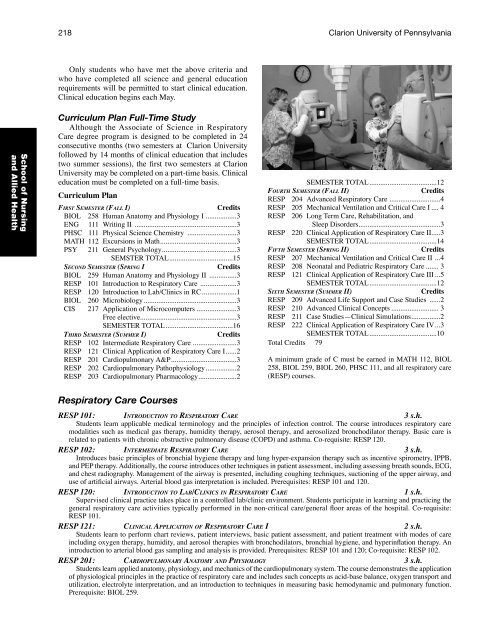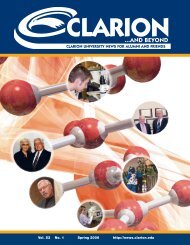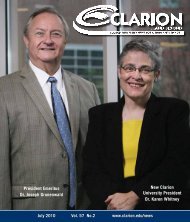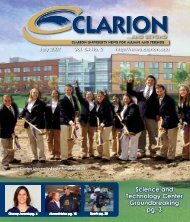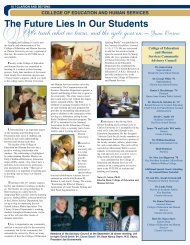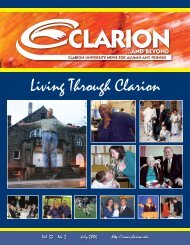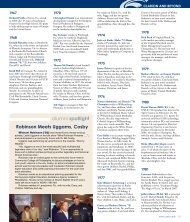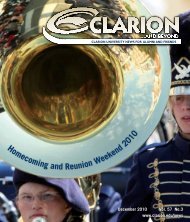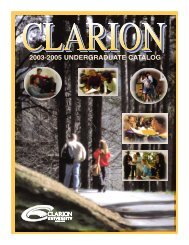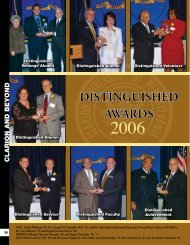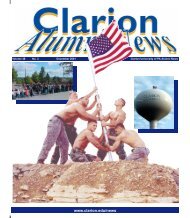pages i-viii218 <strong>Clarion</strong> <strong>University</strong> of PennsylvaniaOnly students who have met the above criteria andwho have completed all science and general educationrequirements will be permitted to start clinical education.Clinical education begins each May.School of Nursingand Allied HealthCurriculum Plan Full-Time StudyAlthough the Associate of Science in RespiratoryCare degree program is designed to be completed in 24consecutive months (two semesters at <strong>Clarion</strong> <strong>University</strong>followed by 14 months of clinical education that includestwo summer sessions), the first two semesters at <strong>Clarion</strong><strong>University</strong> may be completed on a part-time basis. Clinicaleducation must be completed on a full-time basis.Curriculum PlanFirst Semester (Fall I) ...............................................CreditsBIOL 258 Human Anatomy and Physiology I .................3ENG 111 Writing II .........................................................3PHSC 111 Physical Science Chemistry ............................3MATH 112 Excursions in Math..........................................3PSY211 General Psychology.........................................3Semster TOTAL....................................15Second Semester (Spring I .......................................CreditsBIOL 259 Human Anatomy and Physiology II ................3RESP 101 Introduction to Respiratory Care .....................3RESPBIOLCIS120 Introduction to Lab/Clinics in RC....................1260 Microbiology....................................................3217 Application of Microcomputers.......................3Free elective.....................................................3Semester TOTAL......................................16Third Semester (Summer I) ......................................CreditsRESP 102 Intermediate Respiratory Care ........................3RESP 121 Clinical Application of Respiratory Care I......2RESP 201 Cardiopulmonary A&P.....................................3RESP 202 Cardiopulmonary Pathophysiology..................2RESP 203 Cardiopulmonary Pharmacology.....................2Semester TOTAL......................................12Fourth Semester (Fall II) ......................................CreditsRESP 204 Advanced Respiratory Care ............................4RESP 205 Mechanical Ventilation and Critical Care I..... 4RESP 206 Long Term Care, Rehabilitation, andSleep Disorders.............................................3RESP 220 Clinical Application of Respiratory Care II.....3Semester TOTAL......................................14Fifth Semester (Spring II) ......................................CreditsRESP 207 Mechanical Ventilation and Critical Care II ....4RESP 208 Neonatal and Pediatric Respiratory Care........ 3RESP 121 Clinical Application of Respiratory Care III....5Semester TOTAL......................................12Sixth Semester (Summer II) .....................................CreditsRESP 209 Advanced Life Support and Case Studies .......2RESP 210 Advanced Clinical Concepts........................... 3RESP 211 Case Studies—Clinical Simulations................2RESP 222 Clinical Application of Respiratory Care IV....3Semester TOTAL......................................10Total Credits 79A minimum grade of C must be earned in MATH 112, BIOL258, BIOL 259, BIOL 260, PHSC 111, and all respiratory care(RESP) courses.Respiratory Care CoursesRESP 101: Introduction to Respiratory Care 3 s.h.Students learn applicable medical terminology and the principles of infection control. The course introduces respiratory caremodalities such as medical gas therapy, humidity therapy, aerosol therapy, and aerosolized bronchodilator therapy. Basic care isrelated to patients with chronic obstructive pulmonary disease (COPD) and asthma. Co-requisite: RESP 120.RESP 102: Intermediate Respiratory Care 3 s.h.Introduces basic principles of bronchial hygiene therapy and lung hyper-expansion therapy such as incentive spirometry, IPPB,and PEP therapy. Additionally, the course introduces other techniques in patient assessment, including assessing breath sounds, ECG,and chest radiography. Management of the airway is presented, including coughing techniques, suctioning of the upper airway, anduse of artificial airways. Arterial blood gas interpretation is included. Prerequisites: RESP 101 and 120.RESP 120: Introduction to Lab/Clinics in Respiratory Care 1 s.h.Supervised clinical practice takes place in a controlled lab/clinic environment. Students participate in learning and practicing thegeneral respiratory care activities typically performed in the non-critical care/general floor areas of the hospital. Co-requisite:RESP 101.RESP 121: Clinical Application of Respiratory Care I 2 s.h.Students learn to perform chart reviews, patient interviews, basic patient assessment, and patient treatment with modes of careincluding oxygen therapy, humidity, and aerosol therapies with bronchodilators, bronchial hygiene, and hyperinflation therapy. Anintroduction to arterial blood gas sampling and analysis is provided. Prerequisites: RESP 101 and 120; Co-requisite: RESP 102.RESP 201: Cardiopulmonary Anatomy and Physiology 3 s.h.Students learn applied anatomy, physiology, and mechanics of the cardiopulmonary system. The course demonstrates the applicationof physiological principles in the practice of respiratory care and includes such concepts as acid-base balance, oxygen transport andutilization, electrolyte interpretation, and an introduction to techniques in measuring basic hemodynamic and pulmonary function.Prerequisite: BIOL 259.
<strong>Clarion</strong> <strong>University</strong> of Pennsylvania 219RESP 202: Cardiopulmonary Pathophysiology 2 s.h.Students learn to examine pulmonary pathologic disorders for each age group (neonate, child, adult, elderly adult). Each disorderreviewed includes a discussion of related medical history, pathophysiology of the disorder, physical findings, lab data, arterial bloodgases, pulmonary function studies, chest radiography results, and cardiovascular findings. Recommended therapies and prognosisare included. Prerequisites: RESP 101 and 120; Co-requisite: RESP 201.RESP 203: Cardiopulmonary Pharmacology 2 s.h.Students learn to examine common pharmacologic agents used in treatment of the cardiopulmonary system. The course includesrespiratory drugs, such as mucolytics, bronchodilators, anti-inflammatory agents, inhaled anti-microbials, and surfactant acting agents.It also provides an introduction to general antibiotic therapy and basic cardiovascular medications. Prerequisites: RESP 101, 102, and120; Co-requisite: RESP 201.RESP 204: Advanced Respiratory Care 4 s.h.Includes ethical and legal implications of practice, appropriate communication and record keeping, and computer application inrespiratory care, including a study of pulmonary function testing techniques and an introduction to exercise testing. Advanced airwaymanagement techniques and the use of artificial airways are discussed. Prerequisites: RESP 101, 201, and 202.RESP 205: Mechanical Ventilation and Critical Care I 4 s.h.Students learn to initiate mechanical ventilation of the critically ill patient, including indications for noninvasive mechanicalventilation and invasive mechanical ventilation. Initial ventilator settings based on patient size (neonatal, pediatric, and adult) anddiagnosis are reviewed. The course provides an introduction to mechanical ventilators and their function. Prerequisites: RESP 102,201, 202, and 203; Co-requisites: RESP 204 and 206.RESP 206: Long-Term Care, Rehabilitation, and Sleep Disorders 3 s.h.Introduces students to the care of patients in all age groups with chronic pulmonary disorders such as oxygen-dependent andventilator-dependent individuals. The delivery of respiratory care in long-term acute care and non-acute care facilities is included.Students examine programs of cardiopulmonary rehabilitation. Sleep study facilities, sleep apnea testing, and care of the patient witha sleep disorder are reviewed. Prerequisites: RESP 102, 202, and 203; Co-requisites: RESP 204 and 205.RESP 207: Mechanical Ventilation and Critical Care II 4 s.h.Students continue to learn management of critically ill patients who require ventilation support, including how to make appropriateventilation adjustments based on assessment of patient-ventilator interaction and pathophysiology. Students learn how to recognizecomplications of mechanical ventilation through ventilator waveform analysis and patient assessment. Students learn to identifypatient readiness for ventilator discontinuation. Alternative techniques such as high frequency ventilation, nitric oxide therapy, andunilateral lung ventilation are presented. Prerequisite: RESP 205.RESP 208: Neonatal and Pediatric Respiratory Care 3 s.h.Emphasizes care of the premature infant, newborn, and child. Basic forms of therapy for these age groups are reviewed. Includesboth noninvasive and invasive forms of support and ventilator management for neonatal and pediatric patients. Students learn advancedcardiac life support techniques for neonatal and pediatric patients and examine appropriate responses to emergency situations ofcardiopulmonary collapse for newborns and pediatric groups. Additional therapeutic techniques such as nitric oxide, extracorporealmembrane oxygenation, and high frequency oscillation of the infant are presented. Prerequisites: RESP 204 and 205.RESP 209: Advanced Life Support and Case Studies 2 s.h.Students learn advanced cardiac life support (ACLS) techniques for adult patients and examine appropriate responses to emergencysituations of cardiopulmonary collapse. Students also examine various patient cases related to emergency life support. Prerequisites:RESP 204, 205, 207, and 208.RESP 210: Advanced Clinical Concepts 3 s.h.Summative course provides an overview of all respiratory care procedures presented in the program. Students are given the opportunityto evaluate their understanding of key concepts and review areas needing additional study. The course provides an opportunity tofocus on a particular area of interest and includes a review for the NBRC entry level examination. Prerequisites: RESP 204, 205, 206,and 207; Co-requisites: RESP 209 and 211.RESP 211: Case Studies—Clinical Simulations 2 s.h.The course reviews patient cases using a case study or clinical simulation approach. Students review how to gather appropriate data,critically analyze data and recommend patient treatment modalities, and evaluate patient response to treatment and make appropriateadjustments. Students participate in an advanced-level written registry examination for self-assessment and an advanced level clinicalsimulation examination for self assessment. Prerequisites: RESP 204, 205, 206, and 207; Co-requisites: RESP 209 and 210.RESP 220: Clinical Application of Respiratory Care II 3 s.h.During the clinical course, students practice respiratory care techniques in the critical care environment, including techniquespreviously demonstrated and new techniques in ventilator management. Time management skills are introduced. Prerequisites: RESP102, 121, 202, and 203; Co-requisites: RESP 204 and 205.RESP 221: Clinical Application of Respiratory Care III 5 s.h.Students gain additional practice in the critical care unit. Clinical rotations are provided to pulmonary function laboratories,bronchoscopy suites, and additional facilities of the hospital in which respiratory therapists are active. Prerequisite: RESP 220; Corequisite:RESP 207.RESP 222: Clinical Application of Respiratory Care IV 3 s.h.The clinical rotation provides students with experience in neonatal, pediatric, and adult care units. Additional rotations to homecare agencies, sleep study centers, cardiac/pulmonary rehabilitation programs, and extended care facilities. Emphasis is placed onstudents gaining better patient- and time-management skills. Prerequisites: RESP 206, 207, 208, 221; Co-requisites: RESP 209 and211.pages i-viiSchool of Nursingand Allied Health


